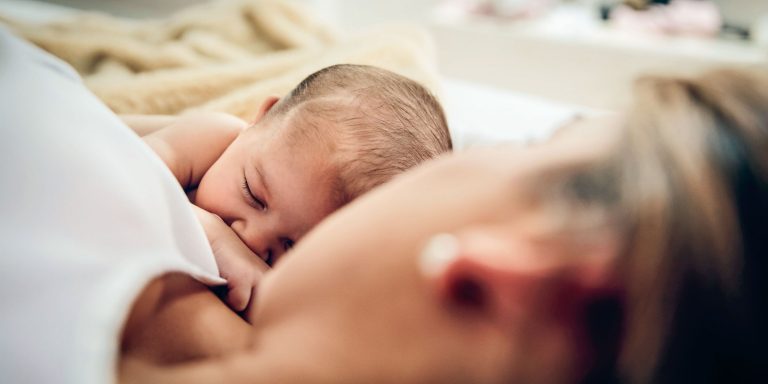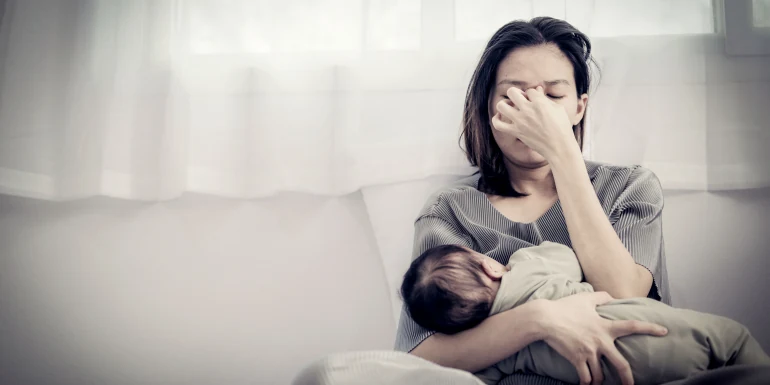Tips on the postnatal period
Your baby has arrived! Congratulations! Now it’s important that your body and your mind recover from the strains and stresses of recent months. That's what the postnatal period is all about. These are the changes you can expect and what will help.

It takes six to eight weeks for the womb to recover. Any birth injuries will also heal during this time. The first few weeks after birth are therefore known as the postnatal period, or puerperium. New mothers should relax and recover from pregnancy and childbirth in the postnatal period.
Make arrangements for the postnatal period before giving birth
Your new everyday life with the baby brings new responsibilities that can ask a lot of you. Arrange a few things in advance:
- Find a midwife: Find a midwife or specialist carer for the postnatal period. They will visit you at home and find out how you and your new baby are doing. They will advise you on looking after the baby, nutrition and recovery, and help you breastfeed.
- Delegate household tasks: Make arrangements so you do not have to do any tiring activities or heavy shopping in the first two weeks. You have enough going on with the baby.
- Accept help: What about a cooked lunch or a voucher for cleaning instead of baby gifts? Be bold and creative!
What exactly happens during the postnatal period?
When the placenta detaches after giving birth, this creates a wound that needs to heal. As the wound heals, this causes post-partum bleeding – also known as lochia. Post-partum bleeding can be heavy at the start and will ease off over time. It can range in colour from deep blood red to yellowish-white. Post-partum bleeding lasts around four to six weeks.
Post-partum bleeding also occurs after a caesarean section. However, as the womb takes longer to recover in comparison with a vaginal birth and a lot of blood is already extracted during the operation, post-partum bleeding may be lighter, but last a little longer.
Tips on post-partum bleeding:
- Lie on your stomach (if possible) and massage your belly to promote the flow. Your midwife will be able to give you tips.
- Pads for post-partum bleeding: avoid using tampons – lochia must be able to flow unobstructed to avoid blockages. Tampons may also transmit bacteria to the womb and cause infection. Ideally, you should stock up on special pads from the supermarket before you give birth. These cotton pads are a little bigger than normal sanitary pads and particularly absorbent. Make sure the pads are not treated with plastic to ensure they are breathable.
- Change the pads regularly to avoid infection – hygiene is particularly important if you have had a perineal tear or episiotomy.
- In the first 10 days, post-partum bleeding is often as heavy as a period. For the first few nights, you should also put a towel in the bed, just in case.
- Avoid bathing during this time to prevent infection.
- Sex also presents a risk of infection. If you do it, always use a condom.
Potential complications:
- Stress can impact the healing of the uterus. If bleeding suddenly starts again, that can be a warning sign. Try to relax.
- If you have no or only little bleeding: your cervix might be blocked, resulting in a lochia blockage. Symptoms include headache, fever, severe pains in lower abdomen, unpleasant-smelling discharge with the odour of rotten eggs.
If you have other symptoms or lower abdominal pain, contact your midwife or gynaecologist immediately.
After birth, the uterus recovers to the size of a pear: from about 1.5 kg to about 60 grams. This process – the involution of the uterus – affects every woman differently. After your first child, you should experience only slight abdominal cramps. After-birth pain is usually worse with every additional child. Women feel it most intensely when breastfeeding. It can also occur after a caesarean section or a womb scrape. It can also cause back pain. After-birth pain usually ends after four days. It should not last any longer than 10 days.
This helps with after-birth pain:
- Breathe the pain out, as you did with labour pains.
- A full bladder can make cramping worse.
- Drink a peppermint tea with at least three sugar cubes.
- Lie on your front every day for 20 minutes, if you can. This position promotes recovery.
- If the pain is still severe: ask your postnatal care team or pharmacist which pain relief is permitted when breastfeeding.
You are on an emotional rollercoaster, from euphoric to overwhelmed – it’s normal to have ups and downs. You also have a few things to process: giving birth, your new role as a parent, breastfeeding. Your daily routine has changed and your relationship takes on new dimensions. You might also be dealing with sleep deprivation. The ‘baby blues’ usually kick in between the third and fifth day, caused by the decrease in pregnancy hormones. They can last a few days. Let yourself feel what you feel. Make sure you rest and have support from your partner and the people around you.
Time for some self-care:
- Forget your perfectionism – and that goes for looking after your home, too. Someone else should be taking care of it right now.
- There’s no rush to do anything! You need time for you and the baby.
- Sleep during the day when your baby sleeps.
- Talk to your midwife or other points of contact about what’s going on with you.
- Don’t be ashamed of your feelings. Motherly love takes time to grow, too.
- Deliberately treat yourself and take half an hour for yourself.
If you feel sad and unmotivated for longer, it might be postnatal depression. Talk to your doctor about
Giving birth may result in a perineal tear (a tear from your vagina to your anus), episiotomy or other birth injuries to the vagina and vulva. Depending on how severe the injury is, this is stitched back up after the placenta is delivered under local anaesthetic. Small injuries that do not bleed will heal quickly and well without stitches. Birth injuries usually heal within two weeks.
Avoid birth injuries: speak to your midwife or gynaecologist about potential ways of preventing a perineal tear or episiotomy before you give birth.
Tips on birth injuries:
- Always wipe backwards after using the toilet to prevent germs and bacteria from the anus getting into the wound.
- Run lukewarm water over the wound when urinating. This keeps the perineal tear clean and reduces the burning sensation.
- A lukewarm sitz bath with camomile, yarrow, arnica or marigold (calendula essence) promotes the healing process. If necessary, have one daily. Keep the wound soft and disinfected.
- Cooling helps reduce swelling: take a condom or a latex glove, fill the finger with water, put in the freezer to freeze, then wrap it in a towel and apply.
- Quark also has an anti-inflammatory effect: mix quark with four drops of lavender oil, then spread 1 cm thick on a compress and apply to the injury. Remove as soon as this stops feeling cool.
- Care: when the stitches have dissolved, massage the scar with almond oil or special scar ointment twice a day.
Luckily, birth injuries to newborns are rare, as difficult births are avoided thanks to caesarean sections.
During pregnancy, the pelvic floor loosens. Childbirth also puts the connective tissue in the pelvis under enormous pressure. The pelvic floor must now be strengthened, so it can resume its full function. A weak pelvic floor can lead to bladder weakness, faecal incontinence, back pain or pelvic floor pain. But there’s no need to worry: targeted exercise will gradually tighten your pelvic floor again.
To ensure your healthy recovery:
- Pelvic floor exercises can be done from birth onwards. However, you should start your actual postnatal exercise only after the postnatal period has passed (six to eight weeks after giving birth).
- Recovery following a caesarean section takes a little longer: wait eight to 10 weeks before doing any postnatal exercise.
- After the postnatal period, gentle exercise such as swimming, walking, yoga and pilates is ideal.
- A recommended high dose of magnesium can help with cramps. Speak to your midwife or doctor about this.
Many new mothers suffer from constipation. There is now more room for your organs inside you. Your bowels take up to two weeks to adjust to the change. Moving around less, pain, fear of straining and loss of fluids due to breastfeeding may also cause constipation. Here’s how to get your digestive system going again:
- Start the day with a glass of lukewarm water.
- Drink two to three litres per day.
- Take short strolls often.
- Eat a high-fibre diet – the following foods are particularly helpful: nuts, flaxseed, legumes, grains and prunes.
- Massage your belly in a clockwise direction, applying a little pressure.
- Stimulate your bowels with pelvic floor exercises.
Milk production makes your breasts bigger, warmer and firmer. This can be painful, but should ease off. Bacteria that enter the breast through minor injuries to the nipple can cause blocked milk ducts or even breast inflammation (mastitis).
This helps with breast pain:
- Make sure your breast has emptied properly.
- Before breastfeeding: heat packs with warm water promote milk flow.
- After breastfeeding: cooling packs with cold water provide relief for the breast.
- If you experience breast redness, cooling quark packs help.
- Gentle breast massage and stroking the breast – your midwife will show you how.
- Apply a special nipple cream in the first two weeks.
- If there’s anything you’re unsure about, contact your postnatal care team or breastfeeding specialist (three consultations are covered by your health insurance).
Our services to help you recover
Under the COMPLETA supplementary healthcare insurance policy, you receive 75% of the costs up to CHF 500 per calendar year for maternity classes, e.g. postnatal recovery or pelvic floor exercises. Alternative methods such as acupuncture also help promote your recovery.
What does health insurance pay for maternity cover?
Basic insurance covers the following services for the postnatal period:
- Home visits: Visits by a midwife or healthcare nurse up to eight weeks after the birth
- Breastfeeding guidance: Three consultations with a midwife or trained breastfeeding specialist
- Breast pump: With a medical prescription, co-payment of up to CHF 340 for purchase of an electronic double breast pump, including accessory set, or up to CHF 175 for purchase of an electronic single breast pump, including accessory set; manual version up to CHF 47
- Medical care: Follow-up checks by a doctor and laboratory tests where necessary
Articles about this topic
Do you have questions?
We're here to help.
